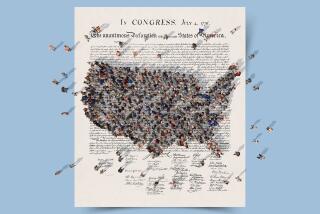Bill of Rights a Product of Politics, Not Principle : Document, Marking 200th Year, Was Designed to End Opposition to Federalism
WASHINGTON â On this day 200 years ago, the House of Representatives finished writing what may be the most memorable and vital phrases of the U.S. Constitution.
In a dozen amendments--10 of which finally were ratified by the states--the members of the first Congress spelled out a Bill of Rights that specifically limited the governmentâs power over its citizens.
Americans were guaranteed the right to speak out without fear of the state. They could worship as they pleased. Their homes and possessions would not be subject to unwarranted âsearches and seizuresâ by federal agents. Today, the Bill of Rights is seen by many as this nationâs most significant contribution to government.
However, this yearâs debate over whether to trim back one of those rights to prohibit the desecration of the U.S. flag has illustrated a telling contrast between how the Bill of Rights is viewed now and how it emerged in 1789.
Critics of the proposed new constitutional amendment, which was spawned by outrage over a recent Supreme Court decision that made flag burning legal as a form of free expression, have attacked the measure as a politically inspired expedient unworthy of a document that symbolizes a triumph of principle over politics.
âI urge you not to commemorate the 200th anniversary of the Bill of Rights . . . by submitting a proposed amendment which would dilute the protections of the First Amendment,â U.S. District Judge Louis Pollak said at a Senate hearing last week.
But historians point out that it was political pressure, not a devotion to philosophical principle, that spurred the first Congress to establish the Bill of Rights.
âThe history of the framing and the ratification of the Bill of Rights indicates slight passion on the part of anyone to enshrine personal liberties in the fundamental law of the land,â Leonard W. Levy of the Claremont Graduate School, the foremost historian of the Bill of Rights, has written. âOur precious Bill of Rights, at least in its immediate background, resulted from the reluctant necessity of certain Federalists (supporters of the new federal government) to capitalize on a cause that had been originated, in vain, by the anti-federalists for ulterior purposes.â
As Congress this fall weighs President Bushâs proposed amendment, along with a Democratic alternative for a narrower anti-flag burning law, the original struggle over the Bill of Rights reflects the blend of motives, political maneuvers and ideals that underlay the birth of the Constitution and have influenced its evolution since then.
As broad statements of principle, the first 10 amendments reflected the strongly held views of Americans regardless of their political stripe. The notion of citizensâ having âcertain inalienable rightsâ that government could not suppress had been first put forth in the Declaration of Independence more than a decade earlier, and the Bill of Rights wrote that notion into law.
Still, historians note, it took political attacks by the Constitutionâs critics to make the Bill of Rights a reality.
Two years earlier, when the new plan for a federal government was being drafted in Philadelphia, the framers of the Constitution, including James Madison of Virginia, had opposed a specific listing of individual rights in the Constitution.
They contended that such a listing was unnecessary because the new government was to have quite limited powers. Because the government had no authority to limit freedom of religion or the press, Madison reasoned, why mention the subjects at all and risk getting bogged down in peripheral issues?
In September, 1787, the members of the Constitutional Convention voted down a proposed Bill of Rights before approving the final document.
But the so-called anti-federalists, who were staunch advocates of investing primary powers in the individual states, rallied opposition to the new Constitution by raising the specter of tyrannical central government with unlimited power to oppress the people.
The lack of a Bill of Rights in the new Constitution nearly caused its defeat. Even in Virginia, the home state of Madison and George Washington, the Constitution was approved by only 10 votes in the state ratifying convention.
Thomas Jefferson, who was then in Paris as Americaâs ambassador, also thought the Constitution was vulnerable without a Bill of Rights. In a series of letters to his friend Madison, he sought to change his mind.
âA Bill of Rights is what the people are entitled to against every government on earth, general or particular, and what no just government should refuse or rest on inference,â Jefferson wrote in one letter to Madison.
When the first Congress convened in New York in April, 1789, Madison and other Federalists embraced the Bill of Rights to deflate the prospects of statesâ rights advocates.
It is a ânauseous project,â Madison confided to a friend during the legislative struggle, but it âwill kill the opposition (to the new central government) everywhere.â
However, his colleagues had other priorities. Then, as now, Congress was beset by budget deficits, and most members thought that the first order of business should be organizing the government and seeking new sources of revenue.
But Madison persisted. In July, he was given permission to form a committee to draw up the amendments. He drew most of the ideas and language from the constitutions of various states. In mid-August, the amendments were debated on the House floor. On Aug. 24, 17 amendments were approved and sent to the Senate.
In a closed session, which was then the norm for the Senate, the upper house pared down the list to 12 amendments. Finally, on Sept. 25, the two houses approved the final versions and sent them to the states for ratification.
More to Read
Get the L.A. Times Politics newsletter
Deeply reported insights into legislation, politics and policy from Sacramento, Washington and beyond. In your inbox three times per week.
You may occasionally receive promotional content from the Los Angeles Times.











